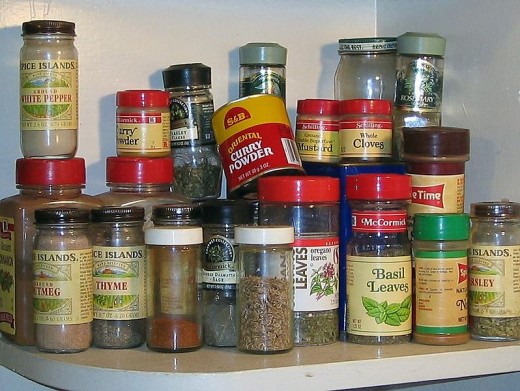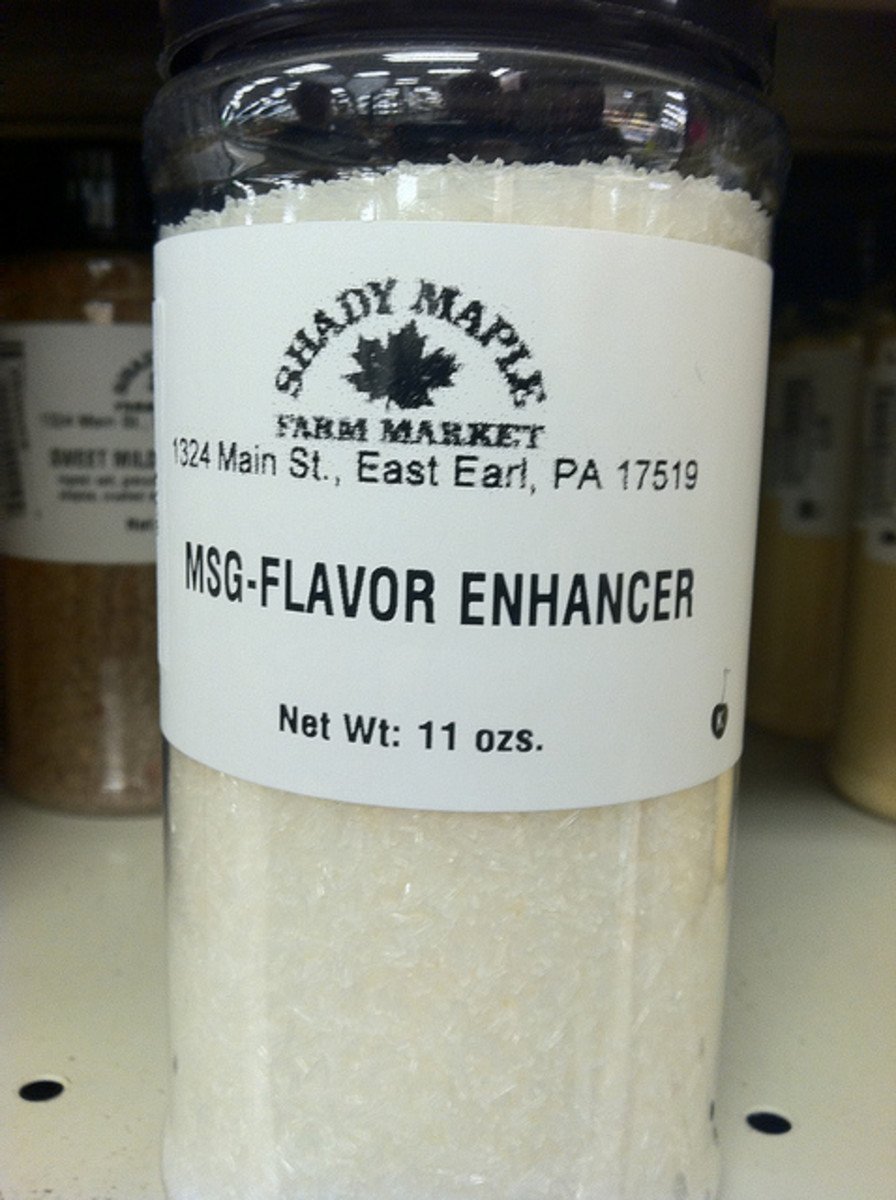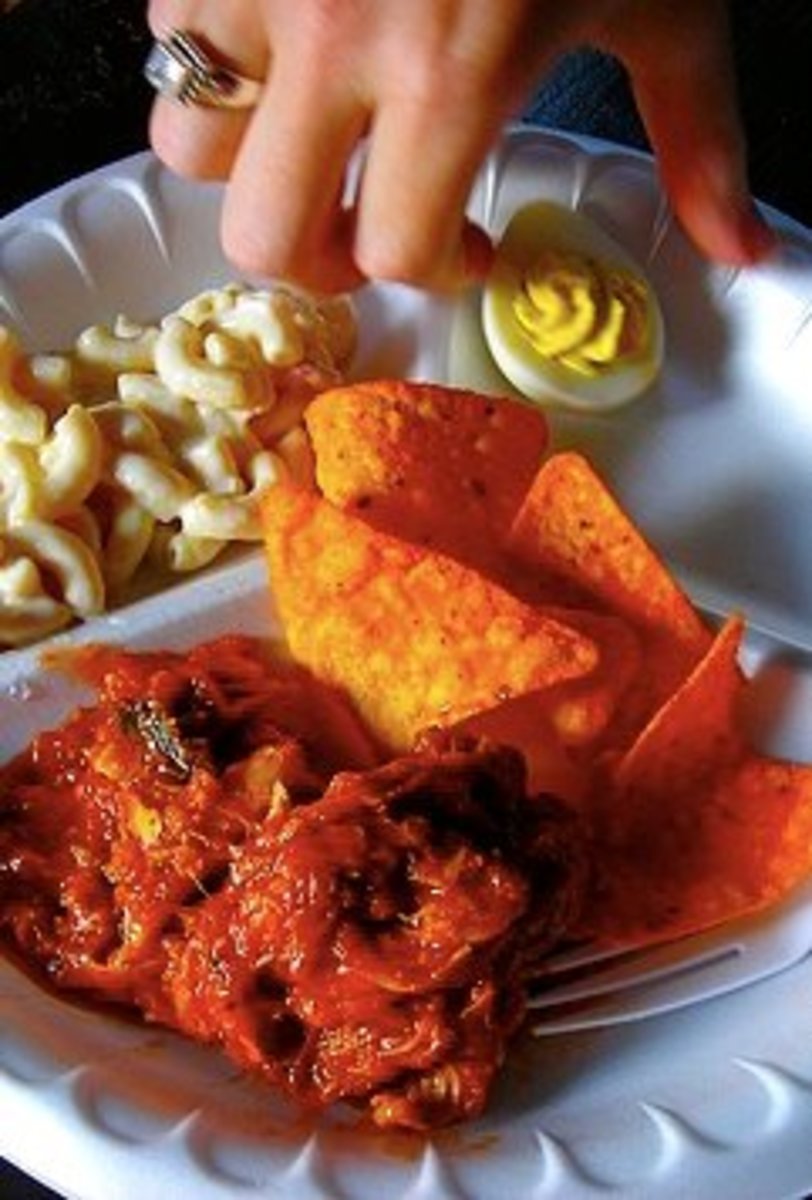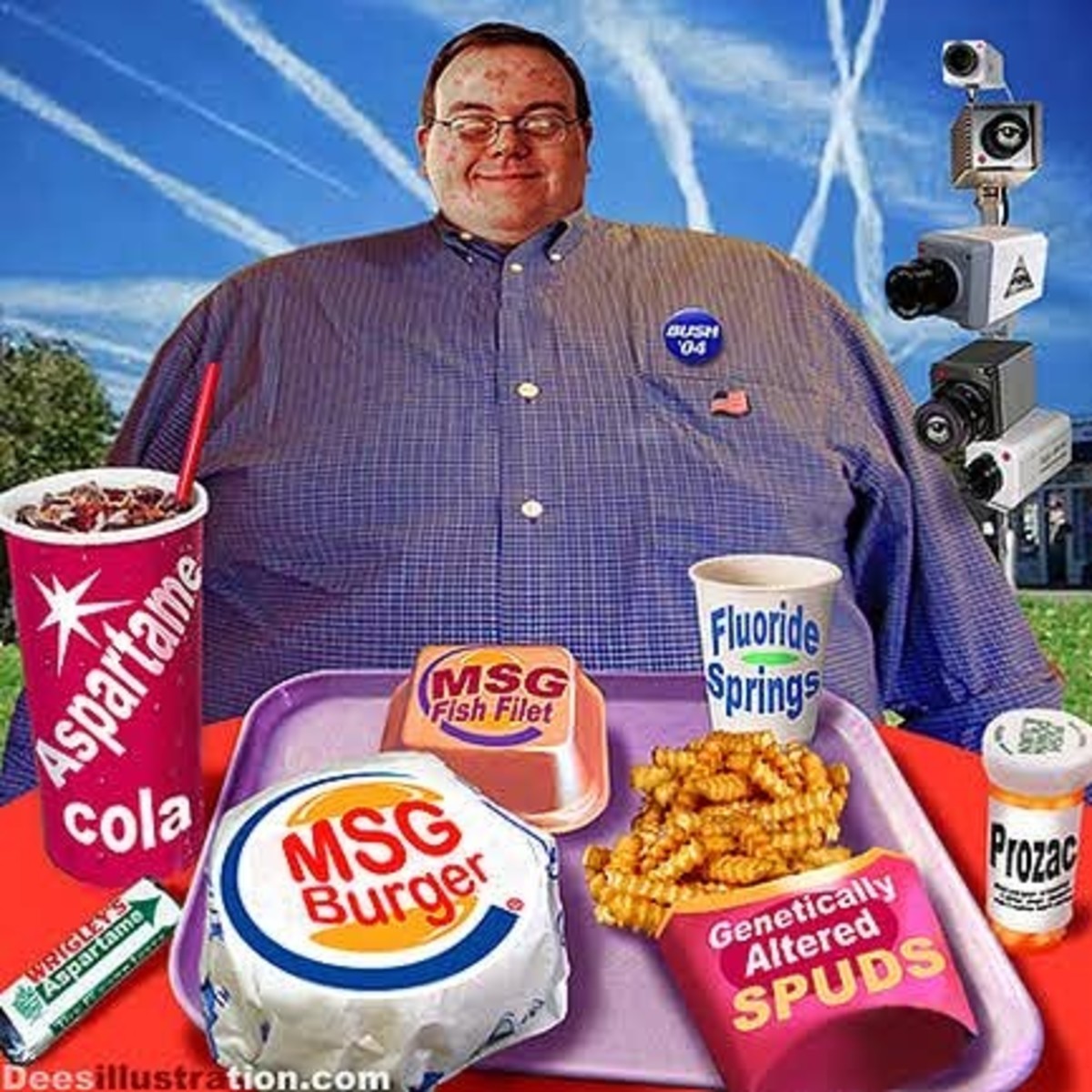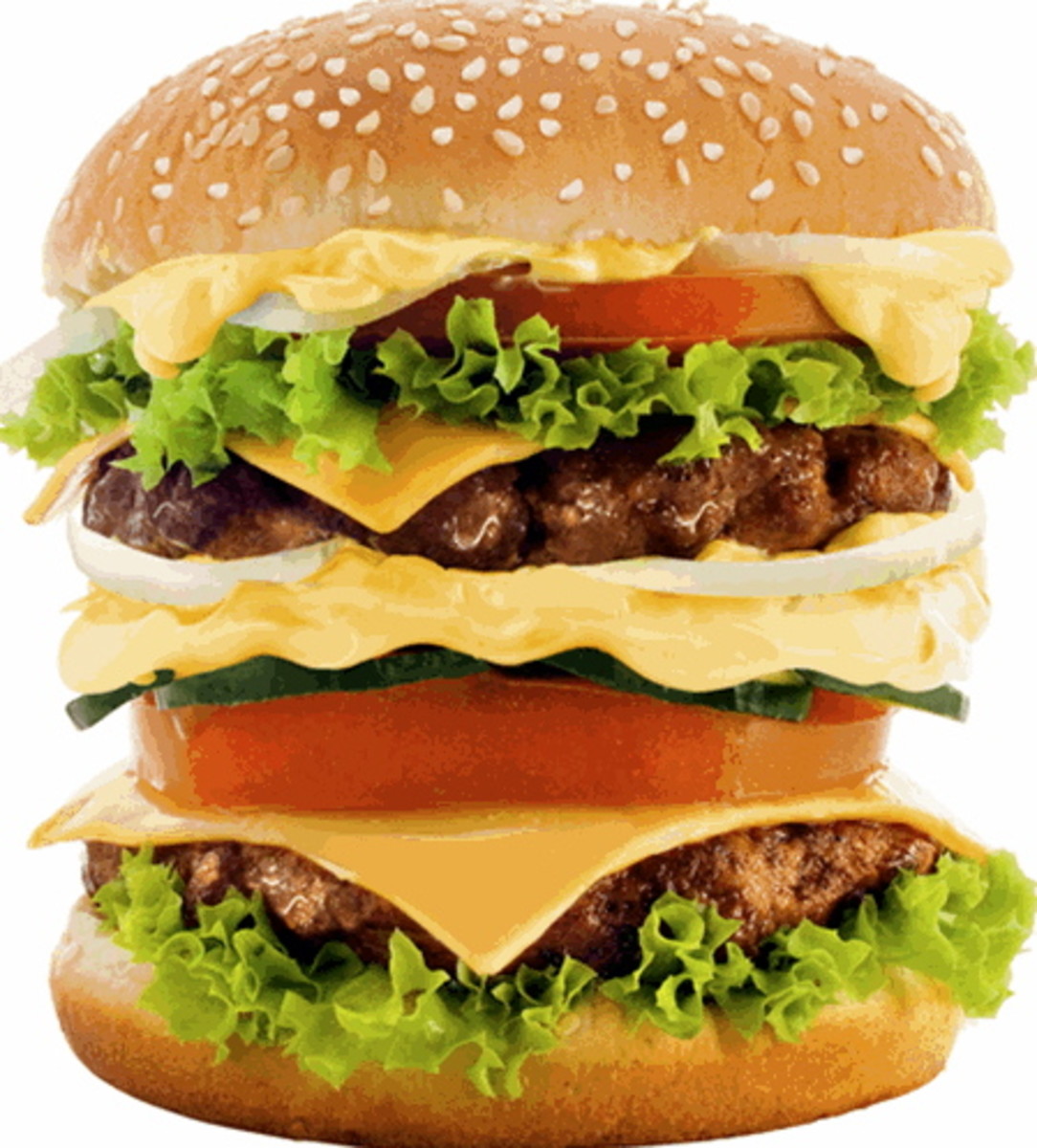Larry's Experiment, Does MSG Cause Obesity?
The background on obesity
Over the last few decades, obesity has become a huge health problem in the USA, the UK, and some other developed countries. Many health writers even use the word epidemic to describe it. Obesity is a risk factor for breast cancer, for Type 2 diabetes, for cardiovascular diseases, and for osteoarthritis.
Here's a refreshing contrast with the depressing news about the dangers of frank obesity: Research at the University of Western Australia suggests that for elderly people, being moderately overweight is not a health risk.
Overweight elderly 'live longer'
The reasons for the obesity trend are not well understood. It's tempting to chalk up our dismal obesity statistics to lack of exercise. Daily strength training for my upper leg muscles has decreased my big appetite somewhat. Although I'm a senior by some measures, I'm slightly less corpulent than I was at age 20.
However lack of exercise is a partial answer. There is much speculation about the other causes of the obesity trend. The High-Fructose Corn Syrup used to sweeten soft drinks in the USA is another proposed villain. There may be a single 'control variable'--like HFCS--which accounts for most of the obesity statistics. Or there may be multiple issues, which taken together, add up to the big problem.
It's predictable that some would blame Mickey D and 'super-sizing' for the obesity trend. Hub author alexadry analyzes the Fast-food Conjecture about obesity from a common-sense perspective.
However occasional fast food does taste good. That's partly because fast-food restaurants pull out all of the stops on seasonings and on flavor-enhancement, as do Chinese restaurants. MSG (monosodium glutamate) is an almost ubiquitous flavoring in both types of food. Does the MSG nudge us into overeating, as some claim? We'll investigate that question in the next section.
And while we're on the subject, why is obesity relatively uncommon in Japan, whose cuisine contains MSG?
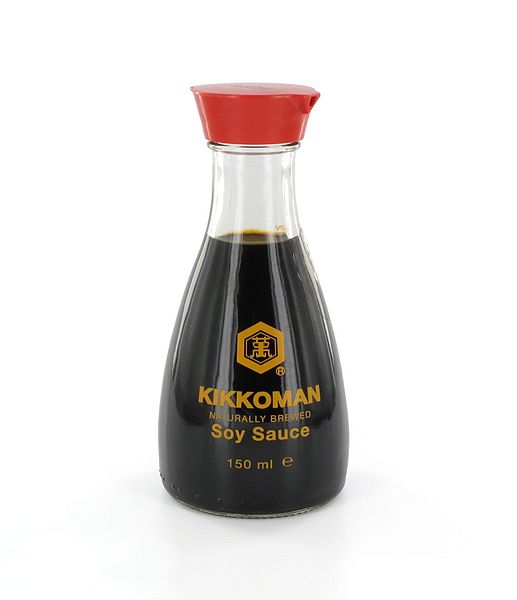

My MSG experiment
Lets explore the question about the putative MSG-obesity connection. I'm aware of many of my 'trigger foods', and I don't feel comfortable keeping some of them in the house. It's very possible that MSG is a 'trigger seasoning' for some people. In late 2011, I decided to do a scientific experiment to test that hypothesis on my favorite guinea pig, myself.
Unfortunately, I did not have any MSG on the spice shelf. And being a cheapskate, I didn't want to buy a bottle of the stuff, and then let it gather dust on my spice shelf for the next 20 years after the experiment. I substituted Sichuan hot sauce. Two items from the list of ingredients were dead giveaways: soy sauce and hydrolyzed vegetable protein. Each of these contains glutamate.
I sipped an entire 11-ounce bottle of the Sichuan sauce, which someone had given me as a housewarming present many years ago. I needed two sessions, because the stuff is really hot! However I can handle spicy-hot seasonings that would cause hair to grow on the feet of lesser mortals.
I did notice two specific cravings. First, for more Sichuan hot sauce. And second, for water! Surprisingly, there were no cravings for carbohydrate-rich food, or for fat-rich food. However if I'd been eating barbecued ribs covered with this sauce, I definitely would have pigged out. If I'd been eating salad instead of ribs, and had substituted Sichuan sauce for the salad dressing, the outcome would have been similar, but with fewer calories in the balance.
One puzzling aspect of the experiment was the capsicum flavor in the sauce. Ordinarily, cayenne is an appetite stimulant for me. That's why I don't use this seasoning very often. The hot sauce should have stimulated my craving for carbs, but it did not.
The take-home lesson from my experiment is that we have multiple food-related cravings. If we want maximum satisfaction from a meal with a minimum number of calories, we need to satisfy as many of those cravings as possible. Going back for seconds on that tuna casserole is not the best strategy for moderate eating when we've already satisfied our carb jones with the first helping, and the only thing we crave is more protein. Self-awareness is more valuable than any of the bogus, one-size-fits-all diet plans promoted by the weight-loss industry.
There are two obvious caveats to my little study. First, an experiment having a sample size of one does not lend itself to sweeping generalizations that apply to most people.
Second, my El Cheapo experiment could have been more elegant. There were other ingredients in the Sichuan hot sauce in addition to glutamate: sherry wine, sesame oil, capsicum and ginger, to name a few.
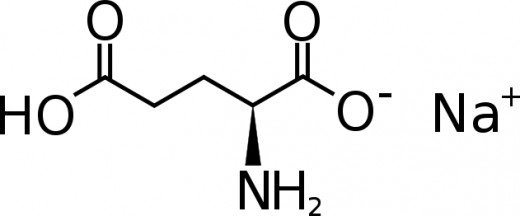
Some serious science on MSG
The Japanese recognize umami (glutamate) as a distinct fifth taste, in addition to the classic tastes: bitter, salty, sour, and sweet. Our sense of smell contributes the remainder of the taste perception of the food that we eat. For a fun experiment, pinch your nose while you eat some yummy food. Much of the tastiness will disappear.
When MSG dissolves in water, it tends to dissociate into positively charged sodium ions and negatively charged glutamate ions. See diagram. The negatively-charged glutamate ion, rather than the positively-charged sodium ion, is the bone of contention.
The bad news is that extremely high levels of glutamate in the brain (where it normally acts as a neurotransmitter) are excitotoxic, and can accelerate the progression of Parkinson's Disease.
The good news is that dietary glutamate does not pass the blood-brain barrier in normal, healthy people. Thus dietary glutamate is not a neurotoxin.
Yes, some individuals do get headaches when they eat too much MSG in their food. At one time, this phenomenon was called Chinese Restaurant Syndrome, for obvious reasons.
Surprise, surprise! MSG is not necessarily benign for all people, in all quantities, at all times, and under all circumstances.
Even if you follow a 100% organic, politically correct, vegan diet, it is not possible to avoid glutamate entirely. Why not?
When you digest protein of any kind--of animal or plant origin--glutamic acid is liberated from the larger parent molecule. For example, wheat gluten is 30% glutamic acid. When dissolved in water, glutamic acid dissociates into positively charged hydrogen ions and negatively charged glutamate ions.
The upshot: Whenever you eat an ordinary meal--organic, vegan or otherwise--you're getting glutamate ions, the equivalent of MSG. If you want to follow a simon pure diet that contains zero glutamate, then you'll need to avoid all protein--even the relatively small concentrations found in rice, corn and potatoes. Unfortunately, total long-term protein avoidance will kill you.
The real MSG (glutamate) issue is about quantity. Here's an old saying from Paracelsus:
"The dose makes the poison."
I've explored that theme in an earlier hub:
The Scare-of-the-Month Club and Evil Chemicals
At the moment, scientific research on a putative MSG-obesity connection is a mixed bag. Here's a recent scientific literature reference, which concluded that MSG use is not associated in a measurable way with obesity in humans.
Shi, Z; Luscombe-Marsh, ND; Wittert, GA; Yuan, B; Dai, Y; Pan, X; Taylor, AW (2010). "Monosodium glutamate is not associated with obesity or a greater prevalence of weight gain over 5 years: Findings from the Jiangsu Nutrition Study of Chinese adults". The British journal of nutrition 104 (3): 457?63. doi:10.1017/S0007114510000760. PMID 20370941
Of course, this study is not a conversation-stopper. When more information from the scientific community rolls in, we'll have a better picture of the risks (and possible benefits) of glutamate.
If you want to be healthier and perhaps a bit leaner, the most important advice I can offer is for you to emphasize the important stuff, about which we already know, rather than wasting your precious time on wild speculations about 'evil' chemicals, whose obesity promoting effects--if any--are still too small to measure. If you don't already have a regular exercise routine, I encourage you to craft one that's comfortable and sustainable for you. Here's a link to my earlier hub about how to
tweak your aerobic exercise routine.
Addendum: Analysis of Paul Lam's anti-MSG article
MSG: More Than Meets the Tongue
The factual content of Paul's article is considerably less than meets the eye. However it's fairly representative of the Scare-of-the-Month-Club online twaddle about 'evil' chemical hobgoblins hiding under our metaphorical beds.
I thank Rasta1 for bringing it to my attention, and for helping me to make this a better hub. Otherwise I would have let sleeping dogs lie, lest discerning readers suspect that I had cherry-picked a monumentally stupid anti-MSG diatribe, in order to make a Straw Man Argument.
Paul claims:
"The MSG manufacturers argue that processed MSG is a pure salt exactly the same as the glutamate in our bodies, whereas, the MSG antagonists argue that processed MSG is impure and also contains a different isomerism, a mirror image of glutamate from the ones naturally made in our bodies."
Larry's comment:
In Nature, all glutamate is left-handed. Transforming all of the natural glutamate in soy protein or in wheat gluten into the right-handed isomer would be pointless and extremely expensive.
Paul claims:
"MSG has various detrimental effects, which include triggering asthma attacks and exacerbating migraine headaches."
Larry's comment:
Paul's sentence is misleading. In the case of nutrients, including nonessential amino acids like glutamate, Paracelsus centuries-old maxim applies. I already mentioned it in an earlier section of this hub, but it's worth repeating.
"The dose makes the poison."
Using the Paul's logic, I could claim that water is 'bad for you'.
*sarcasm on* Here's a thought experiment. Paul parachutes into the middle of Lake Superior, wearing only a Speedo, with no gear whatsoever, just after all of the Winter ice has melted. Conclusion: Water causes hypothermia and drowning. Water is bad, bad, bad. We need a zero-tolerance policy for water. And that includes drinking the vile stuff, and eating any food that contains water. *sarcasm off*
A priori, extremely high doses of glutamate--especially on an empty stomach--have unpleasant effects. But Paul isn't smart enough to see the need for that caveat in his little horror fantasy.
Paul claims:
"Excess glutamate, acting as an excitatory neurotransmitter, causes over stimulation in the brain prolonging the migraine attacks."
Larry's comment:
Paul has neglected to mention the pesky fact that dietary glutamate does not pass the blood-brain barrier in normal healthy adults. Yes, overdosing on MSG can cause headaches. I know, because I had an MSG headache from too much soy sauce many years ago. The mechanism that Paul suggests does not apply to headaches.
Paul claims:
"In more serious cases, MSG may even cause neuronal death due to over stimulation."
Larry's comment:
Yes, extremely high concentrations of glutamate in the brain can be excitotoxic. So what? Again, we need to take the blood-brain barrier into account.
Paul claims:
"Metabolizing glutamate after a MSG-rich meal induces the release of glucose into the blood stream. This in turn triggers the secretion of insulin by the pancreatic islet cells, so that muscle cells can take up glucose. Obesity is characterized, in part, by high levels of plasma glucose and insulin. Studies have shown that mice injected with MSG became obese and eventually lead to insulin-resistance and the onset of Type 2 diabetes."
Larry's comment:
Suppose that we eat more protein than we need. (Proteins are amino acid polymers.) The body can use the excess amino acids as starting materials to make glucose, which it uses for fuel. This process is called gluconeogenesis. When our our blood sugar is low and our glycogen stores are depleted, gluconeogenesis of amino acids from our muscle tissue can also generate much-needed glucose.
For normal healthy people, the insulin released by the beta cells is proportional to the blood sugar concentration. However extremely high oral doses of MSG on an empty stomach can trigger an insulin response in humans. Is this insulin response out of proportion to the amount of gluconeogenesis going on?
If so, the increased insulin levels could depress blood sugar levels, thereby increasing carb cravings. Yes, it's theoretically possible that huge excesses of MSG could be a carb-craving 'trigger' for some moderately overweight people. And yes, I know about carb-craving triggers, because I have some. The above experiment has demonstrated that MSG is not one of mine.
There's another question here. Ordinarily, MSG is consumed with food. How relevant are studies in which large doses of MSG are taken on an empty-stomach? *drumroll* Again, the dose makes the poison.
As I pointed out in an earlier section, the jury is still out on whether or not free glutamate--with food, and in the quantities ordinarily consumed by humans--contributes in a measurable way to obesity in people. Taken as a whole, the studies are inconclusive at this point. It's dishonest to trot out such-and-such a study, and then to claim that this 'proves' the 'evilness' of the MSG Monster.
Paul claims:
"Moreover, MSG has been shown to stimulate appetite in humans. Subjects that had MSG-rich meals exhibited more stimulation to eat and ate more often than control subjects."
Larry's comment:
Although I'm not familiar with this particular study, I'll try to put it into perspective.
In the bad old days, being obese was less harmful than in developed countries in the 21st Century. Why? First, you were likely to be killed by tuberculosis or some other infectious disease, before you had a chance to become diabetic, and before you were felled by a heart attack.
Second, the food supply was less predictable. Being fat was a form of insurance against famine.
Being fat was also insurance against major infectious diseases, which were more common in the bad old days. When I was a child, I came down with meningitis. It took many weeks to shake off the disease. By the time I was well enough to resume a normal life, I'd lost a lot of weight. My upper legs were so weak that they were wobbly after walking up a small hill on the way to school. If I'd been underweight at the beginning of the illness, it's possible that I would not have survived.
Fourth, in the bad old days, women encouraged their families to eat. One indirect way to accomplish this objective was to cook great-tasting food, with optimal amounts of flavorings, seasonings, and spices.
Does the use of basil in Italian cooking promote frank obesity? In terms of appetite enhancement, are MSG and basil fundamentally different?
In the Experiment section of this hub, I noted that the glutamate-containing Sichuan sauce created a very specific craving for more of the same. It did not affect my appetite in any other way. I think that a part of obesity stems from a relative inability to sort out the various types of hunger signals.
Paul claims:
"Many manufacturers rename the monosodium glutamate ingredient to euphemistic terms such as, malt extract, corn syrup, cornstarch, or hydrolyzed “anything”.
Larry's comment:
Although corn syrup does not contain monosodium glutamate, there may be trace amounts of free glutamate. Early steps in the manufacturing processes remove most--but not all--of the corn protein. It's very possible that a later step could inadvertently break down part of the remaining corn protein into its component amino acids.
One nice thing about my academic specialty, analytical chemistry, is that we can easily measure ppm concentrations of the stuff, if it's really there. Are tiny amounts of free glutamate in cornstarch and corn syrup cause for concern? Not particularly.
However some people are highly allergic to corn protein, and to some corn protein peptides (fragments of the parent protein molecules). If you have a severe corn allergy, please check with your physician before eating cornstarch or corn syrup. Ditto for restaurant foods and convenience foods that contain these ingredients.
Conclusion for the Addendum section:
I am not saying that MSG is wonderful, nor am I saying that it's risk-free. In fact, I'm not saying that anything is 100% risk-free. However I do have some free advice for stealth Luddites who aspire to be taken seriously as health writers by scientifically literate people: Grow up!
